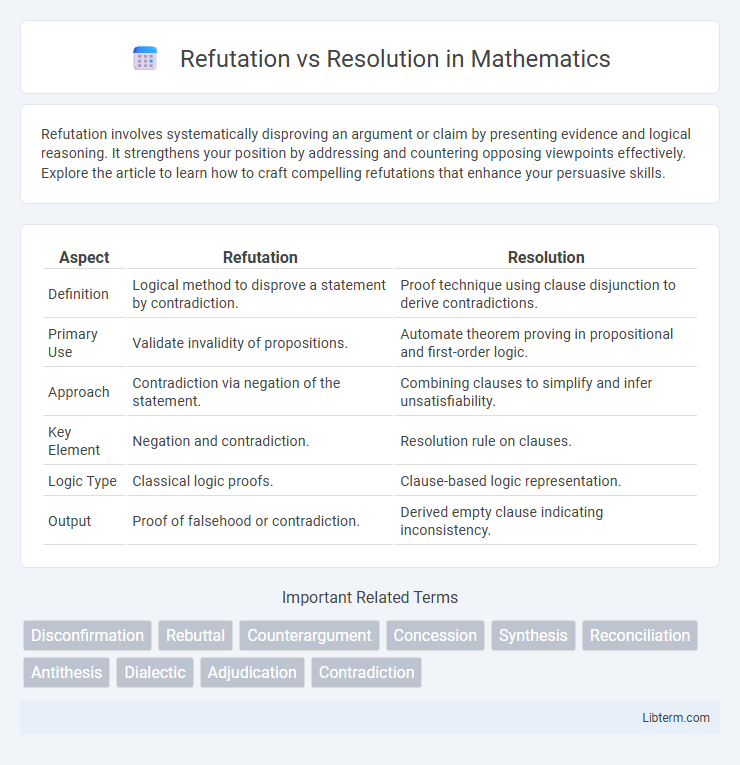Refutation involves systematically disproving an argument or claim by presenting evidence and logical reasoning. It strengthens your position by addressing and countering opposing viewpoints effectively. Explore the article to learn how to craft compelling refutations that enhance your persuasive skills.
Table of Comparison
| Aspect | Refutation | Resolution |
|---|---|---|
| Definition | Logical method to disprove a statement by contradiction. | Proof technique using clause disjunction to derive contradictions. |
| Primary Use | Validate invalidity of propositions. | Automate theorem proving in propositional and first-order logic. |
| Approach | Contradiction via negation of the statement. | Combining clauses to simplify and infer unsatisfiability. |
| Key Element | Negation and contradiction. | Resolution rule on clauses. |
| Logic Type | Classical logic proofs. | Clause-based logic representation. |
| Output | Proof of falsehood or contradiction. | Derived empty clause indicating inconsistency. |
Understanding Refutation and Resolution
Refutation involves directly challenging an argument by presenting evidence or reasoning that disproves its validity, making it essential for critical thinking and debate. Resolution refers to the clear statement of a position or the process of reaching a conclusion after evaluating opposing viewpoints, which guides structured argumentation. Mastery of refutation and resolution enhances persuasive communication by enabling effective counterarguments and coherent conclusions.
Key Differences Between Refutation and Resolution
Refutation involves directly disproving or arguing against a specific claim or argument, targeting the opposing viewpoint to demonstrate its flaws or inaccuracies. Resolution refers to the process of finding a solution or settling a dispute through discussion, compromise, or decision-making, aiming to resolve conflicts or disagreements constructively. While refutation challenges the validity of an argument, resolution focuses on agreement and problem-solving outcomes.
The Role of Refutation in Argumentation
Refutation plays a crucial role in argumentation by directly challenging opposing claims and exposing logical flaws, inconsistencies, or evidential weaknesses. It strengthens a speaker's position by systematically dismantling counterarguments, thereby enhancing the persuasive impact of the overall argument. Effective refutation requires critical analysis and evidence-based reasoning to undermine objections and reinforce the resolution's validity.
How Resolution Shapes Conflict Outcomes
Resolution shapes conflict outcomes by facilitating mutually agreeable solutions that transform disputes into opportunities for collaboration. Through structured dialogue and negotiation, resolution promotes understanding, reduces hostility, and establishes durable agreements. This process is critical in shifting conflicts from adversarial standoffs to constructive problem-solving frameworks.
Techniques for Effective Refutation
Techniques for effective refutation involve clearly identifying and addressing specific points in the opposing argument with evidence and logical reasoning. Employing strategies such as conceding valid points while highlighting flawed assumptions strengthens credibility and persuasiveness. Utilizing precise data, expert testimony, and structured analysis ensures the refutation directly undermines the core arguments of the opposition.
Strategies for Achieving Resolution
Effective strategies for achieving resolution emphasize active listening, which fosters mutual understanding and de-escalates conflicts. Employing collaborative problem-solving techniques enables parties to identify shared interests and develop mutually beneficial solutions. Utilizing clear communication and empathy strengthens relationships, promoting lasting agreements rather than mere refutation of opposing viewpoints.
Common Misconceptions: Refutation vs Resolution
Refutation is often misunderstood as merely disproving an argument, while resolution involves thoroughly addressing and resolving the core issues within a debate. Many confuse refutation with simple contradiction, overlooking that effective refutation requires evidence-based counterarguments to dismantle specific claims. Resolution, in contrast, aims to reach a conclusive agreement or outcome by synthesizing opposing viewpoints and ensuring clarity in argument structure.
Impact of Refutation on Decision-Making
Refutation plays a critical role in decision-making by rigorously challenging assumptions and exposing weaknesses in arguments, which sharpens the evaluation process. It drives more thorough analysis and prevents premature conclusions by encouraging stakeholders to reconsider evidence and perspectives. This impact results in more informed, balanced, and ultimately effective decisions.
Resolution as a Tool for Conflict Management
Resolution serves as a critical tool for conflict management by facilitating constructive dialogue and fostering mutual understanding between parties. It emphasizes collaborative problem-solving techniques, such as negotiation and mediation, to achieve sustainable agreements that address underlying issues. Effective resolution reduces hostility and promotes long-term peace by focusing on common goals rather than highlighting disagreements or refuting opposing arguments.
Choosing Between Refutation and Resolution
Choosing between refutation and resolution depends on the complexity and nature of the issue at hand. Refutation targets specific arguments by disproving their validity, making it effective for clear-cut disputes or when evidence directly contradicts a claim. Resolution involves finding a mutually acceptable solution, preferred in situations requiring consensus or when addressing underlying interests beyond the arguments themselves.
Refutation Infographic

 libterm.com
libterm.com